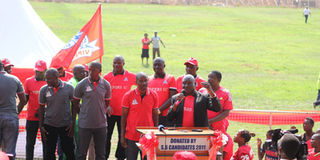It’s not for football to decide who it owns, disowns morally

Giving back. Former Fufa president Lawrence Mulindwa proved that he more than cares about the game when he initiated plans to construct Vipers a home ground at St Mary’s Stadium next to his school in Kitende a couple of years ago. PHOTO BY ISMAIL KEZAALA
What you need to know:
- STRAIGHT THINKING. It is an undeniable fact these ‘rich men’ possess admirable qualities needed to succeed at business and the big heart needed to be generous.
- That is how they end up with the money they give to football in the first place.
I have been thinking. Why is it that in this country we love to talk about the ‘rich men’ of football, but rarely appreciate their personal contributions to the game?
The occasional bar gossip about their ‘real’ worth and their political ambitions aside, we hardly discuss them in flattering terms.
A friend of mine (names withheld on request) brought this up recently. It encouraged me to take note of the personal contributions of people like the late Patrick Kawooya and many others I don’t recall or even know. This friend claims we cloud ourselves with unnecessary prejudices and lose sight of tangible benefits that such people have created, deliberately or otherwise.
I did not entirely think so at first, but the conversation triggered in me an impulse of curiosity. I felt there was something to discover if only I shed my biases. And I have many.
So, after further questions and debates I am convinced that our rich men are often accused of being crooked, and rightly so because it is true not all their intentions or motives are selfless. But also, it is an undeniable fact that many possess the admirable qualities needed to succeed at business and the big heart needed to be generous. That is how they end up with the money they give to football in the first place. The sentiments this conveys to me are of a mutually beneficial existence. For instance, a proprietor uses his school to feed his football club. He is contributing to the game through his other commercial activities. Fair enough.
But a moral question will always arise if he uses his links to the highest football administration offices to guarantee his players national team berths or attract the best talent into his club.
My friend, however, says if the end game is say a facility that benefits all Ugandan football, he does not care. Neither should we self-righteous people, he adds. I must say that even if I would not condone this, I do appreciate his point of view.
So, if we returned to our initial question: why are the contributions of rich benefactors not appreciated by us? I believe it is due to prejudice: the prejudice of those who would not condone corruption; and the opposite prejudice, among those who would be just as corrupt given the chance, but are being governed by envy due to lack of opportunity, and so on.
Since neither position is flattering, I would rather that we appreciated, our luggage and all, come to the game with the same expectations with which one would go to say an art gallery: to be inspired.
But to start moralising on what can and can’t inspire us is to crowd the arena unnecessarily.
Besides, I have never trusted football’s ability to question and judge the uprightness of individuals. That authority and responsibility lies outside the game in the cultures of a wider society.
To force it upon football is to risk taking away much needed input, when all the game needs is universal love.
[email protected]
MBanturaki




